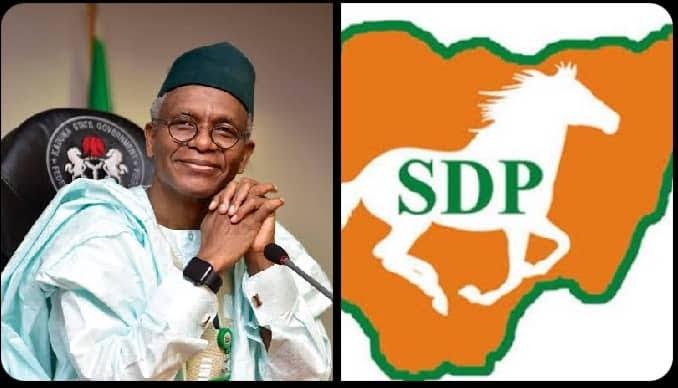The Social Democratic Party (SDP) finds itself in the eye of a political storm. What began as a routine defection has morphed into a high-stakes drama, pitting ideals against ambition, unity against division, and the dream of a “third force” against accusations of a ruling-party ploy.
At the center of it all stands Nasir El-Rufai, the polarizing former governor of Kaduna State, whose leap from the All Progressives Congress (APC) to the SDP has ignited a firestorm of debate: Is this the birth of a credible opposition or a masterstroke in President Bola Tinubu’s alleged divide-and-rule playbook?
Barely 72 hours after El-Rufai’s defection, the SDP’s national headquarters in Abuja became a battleground. Protesters loyal to the ex-governor waved placards demanding the ouster of National Secretary Olu Agunloye, chanting, “Agunloye must resign! Save SDP’s legacy!” The scene laid bare the fissures within a party now torn between embracing El-Rufai’s star power and preserving its identity.
The SDP Integrity Group, a faction of longstanding members, issued a blistering rebuke: “A joiner of less than one week cannot become our leader. The SDP is not a refuge for those haunted by their past.” Their statement condemned the “transactional” push to anoint El-Rufai, alluding to corruption probes into his Kaduna tenure. Yet, SDP presidential candidate Adewole Adebayo struck a conciliatory tone, welcoming El-Rufai as an “avid worker against poverty and insecurity.”
The clash encapsulates the SDP’s existential dilemma: court a controversial heavyweight to challenge the APC or risk remaining politically irrelevant.
Tinubu’s “Divide and Rule” – Fact or Fiction?
The ruling APC wasted no time framing El-Rufai’s move as a personal tantrum. Presidential aide Daniel Bwala dismissed it as “an inordinate ambition destined to fail,” attributing it to El-Rufai’s “trauma” over a missed ministerial appointment. The APC’s Kaduna chapter echoed this, boasting of “caliber politicians streaming in daily” despite El-Rufai’s exit.
But critics like Buba Galadima of the New Nigeria Peoples Party (NNPP) see a darker design. “The SDP is just an APC branch,” he declared, suggesting Tinubu’s camp might be orchestrating opposition fragmentation. This theory gains traction as El-Rufai’s defection coincides with his newfound camaraderie with Atiku Abubakar (PDP) and Peter Obi (Labour Party), key figures in talks of a “mega coalition.” Is the SDP a Trojan horse to splinter this alliance?
North vs. South: A Regional Rift
El-Rufai’s defection has also exposed Nigeria’s enduring regional divides. Northern Elders Forum (NEF) spokesperson Suleiman Abdul-Aziz accused him of hypocrisy: “He disparaged Northern leaders but now poses as their champion.” Others, like Mohammed Talban Shika, claim his move has galvanized Northern support for the SDP, citing surges in Kaduna, Zamfara, and Yobe.
In contrast, Southern leaders are split. The South-South Leaders Forum’s Godson Ibrede hailed El-Rufai as a “strong, popular politician” who could “end APC’s destruction,” while Igbo National Council President Chilos Godsent dismissed the defection as “driven by personal interest, not ideology.”
El-Rufai’s Baggage: Asset or Liability?
El-Rufai’s tenure as Kaduna governor looms large. Critics accuse him of deepening religious divides, marginalizing Southern Kaduna, and presiding over controversial demolitions. His feud with political heavyweights like Senator Shehu Sani—now back in the APC—has left him isolated in his home state. “He has no support base here,” APC member Mohammed Aliyu scoffed. “Even former allies have abandoned him.”
Read also: SDP 2023 presidential candidate celebrates El-Rufai defection to SDP
Yet, El-Rufai’s coalition-building credentials are undeniable. As a founding APC architect, he helped topple the PDP in 2015. The Pat Utomi-led National Consultative Front (NCFront) sees value in this, praising his “strategic influence” in uniting opposition factions. But the PDP’s Timothy Osadolor called his SDP switch a “mistake,” urging him to join “Nigeria’s strongest opposition platform” instead.
2027: Kingmaker or Pawn?
El-Rufai’s endgame remains unclear. Is he positioning himself as a presidential candidate, a kingmaker, or a spoiler? His recent meetings with Atiku, ex-President Buhari, and Pastor Tunde Bakare suggest a networking blitz. Meanwhile, the SDP protests underscore a party in turmoil, struggling to reconcile its grassroots ethos with El-Rufai’s top-down approach.
Salihu Lukman, a former APC strategist, warned that El-Rufai’s “premature” defection risks fracturing opposition unity. “We needed a collective move, not a solo adventure,” he lamented.
As Nigeria inches toward 2027, the SDP’s trajectory hinges on resolving its identity crisis. Can it absorb El-Rufai’s ambition without sacrificing its principles? Or will it become a casualty of Tinubu’s alleged machinations to weaken dissent?
For now, the SDP stands at a crossroads, one path leading to revival as a third force, the other to irrelevance as a pawn in Nigeria’s cutthroat political chessboard. In El-Rufai’s gamble, the stakes are nothing less than the future of opposition politics in Africa’s largest democracy.






